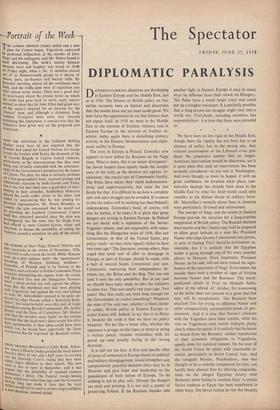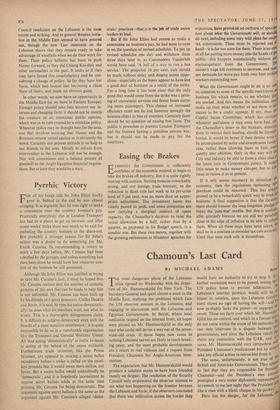DIPLOMATIC PARALYSIS D ANGEROUS - LOOKING situations are developing in Eastern Europe and
the Middle East, just as in 1956. The failures of British policy on that earlier occasion were so blatant and disastrous, that the results have not yet been made good. We now have the opportunity to see that history does not repeat itself. In 1956 we went in the Middle East to the extreme of fruitless violence, and in Eastern Europe to the extreme of fruitless in- action; today again there is disturbing military activity in the Eastern Mediterranean and diplo- matic nullity in Europe.
The crux in Europe is Poland. Gomulka now appears to have defied the Russians on the Nagy issue. What is more, this is no minor divergence : the Soviet leaders have openly made the accept- ance of the trial, as the decisive act against 're- visionism,' the crucial test of Communist loyalty. The Poles have taken their stand undemonstra- tively and unprovocatively, but none the less firmly for that. It is difficult to see how a complete split and open struggle can be avoided. If it comes to this the stakes will be nothing less than Poland's independence. (Gomulka's head, of course, will also be forfeit, if he loses.) It is plain that great dangers are arising in Eastern Europe. In Poland we are faced with a repetition of the Soviet- Yugoslav schism, and not impossibly with some- thing like the Hungarian crisis of 1956. Has our Government, or that of the United States, any policy ready—as they most signally failed to have two years ago? The Spectator, among others, then urged that some sort of offer to disengage in Europe, or part of Europe, should be made, with a belt of neutral States, Communist and non- Communist, exercising their independence be- tween, say, the Rhine and the Bug. This was not (and is not) the only possibility. But in any case we should have been ready to take the initiative in some way. That was nearly two years ago. Two years! Has that really not been long enough for the Government to evolve something? Whatever the state of the cold war, whether it blows hotter or colder, British policy in Eastern Europe re- mains frozen stiff. Indeed, to say that is to flatter it, because the truth is that we have no policy whatever. We are like a boxer who, whether his opponent is groggy on the ropes or about to swing a vicious punch, remains motionless with his guard up—and usually facing in the wrong direction.
It is still not too late. A firm and specific offer of terms of settlement in Europe based on political and military disengagement, would strengthen any comparatively peaceful elements there may be in Moscow and give hope and leadership to the populations of both halves of Europe. To do nothing is not to play safe. Already the dangers are stark and pressing. It is not only a matter of preserving Poland. If the Russians blunder into
another' fight in Eastern Europe it may in many ways be different from their attack on Hungary. The Poles have a much larger army and could put up a tougher resistance. It is perfectly possible that a long-drawn-out struggle might turn into a world war. Everybody, including ourselves, has responsibilities : it is time that these were attended to.
We have been no less rigid in the Middle East, though there the rigidity has not been due to an absence of policy but to the wrong one. Any rational examination of the Lebanon crisis pro- duces the conclusive answer that an Anglo- American intervention would be disastrous, yet it is quite plain that such an intervention has been seriously considered—at any rate in Washington. And even though, as must be hoped, if with no great confidence, no invasion takes place, con- siderable damage has already been done in the Middle East by what the Arab world could only consider as the blatant threat of military force. Mr. Macmillan's remarks about Suez in America were particularly ill-timed and unfortunate.
The murder of Nagy and the events in Eastern Europe provide the occasion for a long-overdue reappraisal of British policy. The Russian Stalinist doctrinaires and the Chinese may well be prepared to allow great latitude to a man like President Nasser who claps his own Communists into prison, in spite of finding Tito's Socialist revisionism in- tolerable, but it is unlikely that the Egyptian leader is going through one of his more popular phases in Moscow. More important, President Nasser, on his side, will not have missed the signi- ficance of the execution of Nagy. Even before the murder there were a number of signs of friction between Nasser and the Russians. The much- publicised attack in Trud on Mustafa Amin, editor of the official Al 'Akhbar, for kowtowing to the dollar does not amount to a great deal but may still be symptomatic. The Russians have attacked Tito for trying to influence Nasser and other comparatively uncommitted heads of gov- ernments. And it is true that Nasser's relations with the Yugoslays have been cordial, while his visit to Yugoslavia next month indicates pretty clearly where he stands. It is unlikely that he learnt no lesson from the Russians' sudden repudiation of their economic obligations to Yugoslavia, openly done for political reasons. On his tour of the Soviet Union he spoke with reasonable re- straint, particularly in Soviet Central Asia. And the renegade Muslim, Mukhitdinov, who was thought to be a suitable companion for him, can hardly have pleased him by offering congratula- tions on the alleged Egyptian victory over Rommel, while failing to mention Suez. A certain Soviet coolness to Egypt has been manifested in other ways. The Soviet failure to veto the Security Council resolution on the Lebanon is the most recent and striking. And in general Russian initia- tive in the Middle East seemed to have petered out, though the new Tass statement on the Lebanon shows that they remain ready to take advantage of windfalls when we do their work for them. Their policy hitherto has been to push Nasser forward, as they did Chiang Kai-shek and other nationalists in the past. It looks as if they may have found this unsatisfactory and be con- sidering a change of policy. So far they have lost Syria, which had looked like becoming a client State of theirs, and made no obvious gains.
In other words, we now have an opportunity in the Middle East (as we have in Eastern Europe). Foreign policy should take into account our in- terests and changing facts; it should not be merely the creature of an emotional public opinion, which was in its turn created by a mistaken policy. Whatever policy may be thought best for the area, one that involves securing ,that Nasser and the Russians remain united against us is obviously the worst. Certainly our present attitude is no help to our friends in the area. Merely to refrain from intervention in the Lebanon will not be enough. Nor will concessions and a belated gesture of goodwill in the Anglo-Egyptian financial negotia- tions. But at least they would be a start.



































 Previous page
Previous page